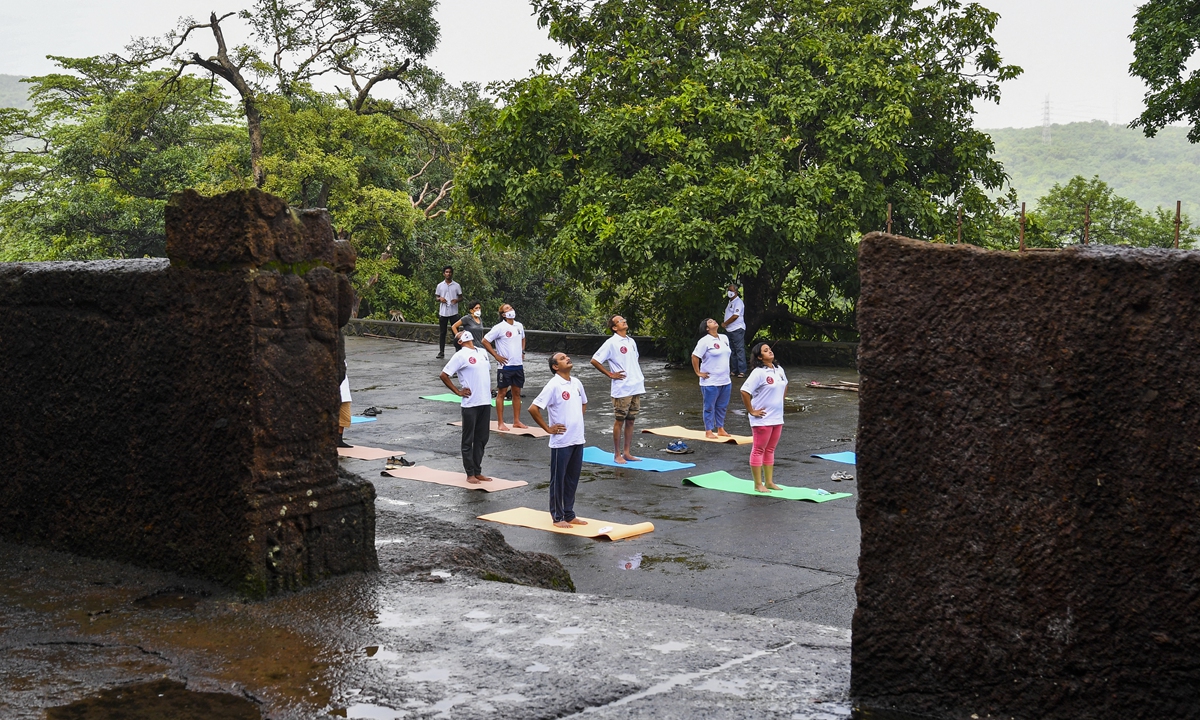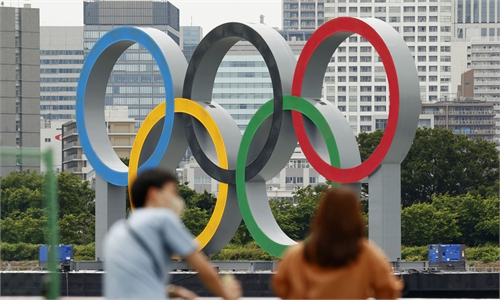
People take part in a yoga session at the Kanheri Caves on the outskirts of Mumbai on Monday to mark the International Yoga Day. Over a dozen cities and regions in India eased lockdown restrictions on Monday. Photo: AFP
Over a dozen cities and regions in India eased lockdown restrictions on Monday, also celebrated as the 7th International Day of Yoga. Known as a yoga enthusiast, Indian Prime Minister Narendra Modi during a virtual appearance on Monday described Yoga as a "ray of hope" and a "source of strength" for the COVID-19 fight which has caused 29.9 million infections and 388,000 deaths in the country.
India has seen a decline in positive cases, on Monday recording 53,256 new infections and 1,422 deaths over the past 24 hours.
Under the cheerful atmosphere of Yoga Day, Karnataka state in southwest India announced relaxations from Monday in 16 districts that have recorded fewer cases, including Bangalore.
Media reported that crowds thronged the streets of many parts of India after anti-epidemic measures were relaxed. People returning to work gathered at railway stations and shopping malls in Delhi over the weekend. Many ignored mask-wearing and social distancing rules.
The Delhi government on Sunday announced it would reopen bars, public parks, gardens and golf clubs from Monday. Restaurants can serve alcohol from Monday and outdoor yoga activities will be allowed.
However, citing an expert, Reuters reported that easing the lockdown before the epidemic is under control may lead to a third wave of coronavirus infections, which is likely to hit India by October.
Experts reached by the Global Times said that India should avoid seeing the "restart" as a victory and should speed up its national inoculation program to stave off the cycle of lockdowns and reopenings, to placate worldwide concerns over new strains evolving in the environment, as the Delta coronavirus variant detected in India has spread to over 80 countries, posing challenges to anti-pandemic efforts.
However, the Indian government is facing pressure from all sides, and it is hard to find a way to satisfy everyone, especially in a dilemma caused by early inaction, they said.
Pressure to reopen
The economy rather than yoga is the primary factor behind India's decision to ease its lockdown, Qian Feng, director of the research department at the National Strategy Institute at Tsinghua University, told the Global Times on Monday.
The services sector, which accounts for more than half of the country's economy, has a huge number of informal jobs and workers who are paid by day, said Qian, noting that the lockdown has proved effective in curbing the spread of virus, but it also had a huge impact on employment.
A New Delhi-based observer told the Global Times that if Indian migrant workers in cities lost their jobs due to lockdown, the resulting loss of income may drive them back to their hometowns, where they will be more vulnerable to the virus brought by people from cities due to poor medical conditions and lack of protection awareness.
The Modi government's ambitious $5-trillion GDP target is very likely to be wrecked if the epidemic continues to force the administration to decide between lockdowns and boosting the economy, the expert said.
Although Indian media has declared dissatisfaction after the Financial Times said "India's COVID-19 calamity exposes weakest link in 'Quad' alliance," New Delhi is under pressure in terms of politics and diplomacy, some analysts said.
Modi was unable to travel to the UK to attend the highly anticipated anti-China roadshow at the G7 summit due to the "prevailing coronavirus situation."
Delhi on Sunday recorded 124 new COVID-19 cases, while the Bengaluru urban district reported 1,263 infections - much lower numbers compared to the peak of the latest surge.
Although the Indian government was criticized for allowing religious gathering which has aggravated its latest surge, some regions under pressure from religious groups, like Uttar Pradesh, announced it would ease the nighttime curfew by two hours from Monday, and people are allowed to enter religious places with timed entrances and limits on numbers.
The opposition BJP said the government's decision to lift the lockdown is a mistake, which lies in self interest rather than public health.
"Why did the coronavirus threat vanish completely within a day after implementing a strict lockdown in the last few weeks? If that is so, why are the neighboring states continuing with lockdowns and restrictions?" asked BJP politician Vijayashanti, Indian media reported on Sunday.
Rising alarm
As the Delta variant has spread to more than 80 countries, Randeep Guleria, director of the All India Institute of Medical Science on Saturday warned of a possible third domestic wave which could arrive in the next six to eight weeks, Indian media reported.
Guleria said that people should wear masks and stick to social distancing until a majority of the population is vaccinated.
"The vaccination drive across the nation seems to be helping in controlling COVID-19 second wave… We have been hearing about a possible third wave of infections but we are hopeful that current vaccination drive might prevent that from happening," Sai, an Indian software engineer based in Hyderabad, who did not provide his full name, told the Global Times on Monday.
So far the vaccination rollout is not encouraging with 275 million doses given and less than 5 percent of the population fully vaccinated.
Although the Biden administration in April announced that it would lift the embargo of raw materials for Indian's COVID-19 vaccine production, India, with the largest vaccine factories in the world is yet to receive full vaccine delivery, after ordering 356 million doses of two locally made vaccines for use up until July, according to media reports.
The New Delhi-based observer told the Global Times that due to the side effects, not everyone is willing to be vaccinated, and many failed to turn up at jab sites for their pre-booked appointments, causing a huge amount of waste.
"Waste rates can reach up to 30 percent," he said.
Yang Zhanqiu, deputy director of the pathogen biology department at Wuhan University, told the Global Times that vaccinations alone are not enough, as unfortunately, India's management of the epidemic is relatively lax, with large population movements across regions. Systematic methods for tracking infections, similar to China's health code app, are not widely used.
The evolution or mutations of the virus are not directly related to the severity of the epidemic, but if a flare-up continues to develop, it undoubtedly provides conditions for the survival of the virus, Yang said.
Japan tightened COVID-19 protocols for the Indian delegation to the Tokyo Olympics. The team is being asked to undergo daily COVID-19 testing for a week before departure and not interact with anyone from another country for three days on arrival, Indian media said.
India lives and operates by its own rules, but the way it has handled the epidemic has posed a real global strain and challenge, Qian Feng said, noting that India is very likely to have a third wave, although it may be less deadly than the current one if the vaccination program is properly promoted.


